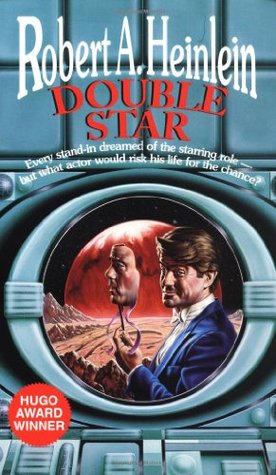This week I'm taking a look at another Heinlein book, Double Star, which is one of his earlier books so it's fairly short and has less of the obnoxiousness people tend to notice in his later books. I say less of his obnoxiousness because there are still some problems but that comes more from a literary perspective rather than him shooting his mouth off on philosophy. I'm also wondering, as I'm finally looking back at Heinlein after years of having not picked up any of his books, if maybe I've grown out of them so to speak. I may want to go back and look at a couple of my favorites, but it may simply be a case of my tastes changing with time and what I thought was super interesting when I was in high school seems somewhat passe as I've grown older. It's hard to say.
The plot of Double Star is described very literally by TV Tropes as ''The Prisoner of Zenda in SPACE!'' Basically an important political figure has been kidnapped and there is an important event coming up where that individual absolutely must be in attendance. In Zenda it's a coronation, in Double Star it's an adoption into a Martian clan. Fortuitously another individual who looks remarkably like the kidnapped individual has been located and recruited to substitute for the kidnappee in the all-important political event. Shenanigans ensue. It's a pretty decent plot that's been used multiple times in literature and recycling it in space is a totally legitimate strategy so I don't really have any problem with that.
The biggest problem I've noticed about this book, and this goes throughout the book, is it suffers so much from telling instead of showing. Important things are told to us rather than being shown when they really, absolutely, should be shown. And I understand it. It makes for much easier writing. It's much easier to say the Martian adoption ceremony is super important and wonderful and full of symbolism rather than spending hours over your typewriter trying to come up with actual events to show how it's actually wonderful and full of symbolism. And there are some good showing passages in the novel, but it's almost entirely told from a telling perspective.
And I think that partly has to do with the nature of the book, which I have to keep in mind. This book was originally written as a serial in science-fiction pulp magazines and was later put into novel form. This was actually pretty standard for a lot of books written during the 40's and 50's and it influenced how sci-fi novels were written. You have a lot of decent-length chapters with interesting stuff going on to keep readers interested month after month in the story, but you don't want to let the story go on for too long before people start losing interest. And so I can understand how Heinlein and other authors, who are doing this for money and need to produce something within a certain time frame, may resort to telling instead of showing to make sure they meet deadlines. So I think I understand where it's coming from at least from a systemic standpoint.
However, at the same time I feel like it's still fair to judge literature, regardless of its form and origins, by certain yardsticks. Sure, literature is going to be one of those things that's highly subjective depending on people's personal tastes. A book might be the most exquisitely written thing in the world, but if it's got shirtless vampires brooding all over the place I'm probably still not going to like it. And if it has giant robot tanks? Well, I might tolerate certain stumblings as long as I get my robot tanks. But regardless, I think we can still look at things like characterization and showing versus telling to make judgements of books regardless of their content.
So where does Double Star fall? It's okay I guess. The plot's interesting and it comes with Heinlein's usual peccadillos that you can expect in a 1950's science fiction story. There's an author filibuster, but it's for interspecies tolerance which is something I think we can all get behind. The biggest weakness throughout this book though is its writing. Consistently there are things that should be shown but are rather told to us, something I'm beginning to realize in other space operas. It's okay, but I wouldn't go around calling it great literature. The ultimate irony is that this was Heinlein's first Hugo Award. So what the heck to I know?
- Kalpar


No comments:
Post a Comment